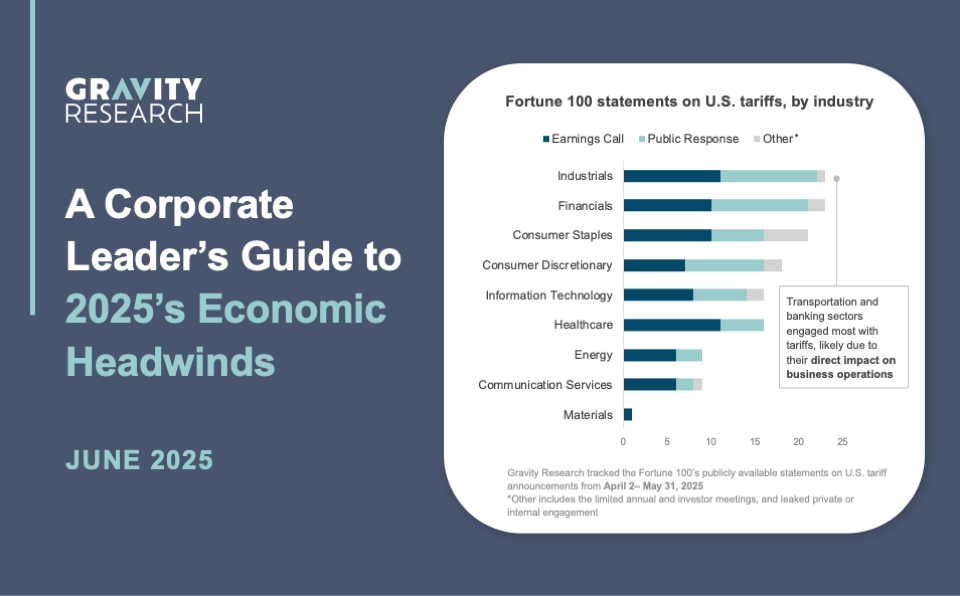This week, hundreds of corporate leaders will be in Dubai at COP28, the United Nations annual climate conference. Along with global heads from 198 countries and parties, as well as negotiators, climate advocates and more, multinational brands will be part of discussions on addressing the global threat posed by climate change.
Following the 2015 COP21 Paris Agreement, which pledged to limit global warming to below 2 degrees Celsius, each successive COP has outlined more ambitious actions to slow climate change. Eager to engage in meaningful discussions and lower their carbon footprint, major brands helped lead the way. But now, corporations are viewing climate and sustainability as a top reputational risk, largely because of competing pressures they’re facing from activists, consumers, and lawmakers. We dive deeper into these risks, the increasing scrutiny, and three tactical approaches for mapping the way forward.
Why Is Climate Action Posing A Risk?
Gravity Research polled its Corporate Insider Group—an exclusive and confidential panel of nearly 200 Fortune 1000 executives who play an integral role in navigating societal pressures for their companies—on these current climate risks. Sixty percent of insiders believe growing scrutiny of corporate climate and sustainability commitments pose a near-term reputational risk. As COP28 spikes attention on climate change and sustainability issues, media coverage of the event and resulting policy changes pose risks to corporate climate and sustainability initiatives.
Why is this? Corporations feel pressure from progressives and employees to act on climate but fear subsequent backlash from conservatives. In our poll, 91% felt pressure to engage from liberal policymakers and 83% from employees, while nearly 91% felt a top threat of backlash from conservative activists and 86% from conservative policymakers. The consumer perspective is mixed. Insiders responded that consumers are more likely than not to respond with backlash to climate actions; however, this backlash typically comes from progressive consumers who feel companies are not doing enough. Forty-six percent of insiders said they felt pressure to engage from consumers while 54% feared the threat of backlash. Even so, Gravity’s Insiders believe pressures to act on climate exceed backlash risks.
What Are The Risks?
Progressives most commonly scrutinize corporations’ external climate change engagements, such as sponsorship of climate events – such as NYC Climate Week, or COP28 itself – or new
sustainability-focused product lines – labeling as “sustainable” or ”green,” which is often targeted as “greenwashing”.
Internal commitments can also be scrutinized, such as not meeting commitments outlined in company policy or ESG (Environmental, Social and Governance impact) reports or changing policy language away from ESG. The events of COP27 in Egypt that drove corporate risk may serve as a bellwether for this year’s potential risks. Sponsorship dynamics, the location of COP28, and activist pressures combine to present tricky dynamics for corporations. For example, Coca-Cola was one of five sponsors of COP27. Activists called the sponsorship hypocritical and alleged that a company designated as a high polluter should not sponsor the event. Activist group Corporate Accountability launched an open letter calling for the removal of all corporate polluters.
The location also became a risk factor. Egypt was accused of “greenwashing” its human rights record, particularly its treatment of political prisoners. Criticism of the UAE’s human rights record on issues like migrant labor, LGBTQ+ rights, and gender equity could present similar risks. The Emirates’ role in the Yemeni civil war and humanitarian crisis and its actions in addressing the Israel-Hamas conflict could also be scrutinized. Finally, UAE’s role as a major oil producer has already drawn criticism and will likely receive more.
With a pulse on these climate issues and how leading executives are navigating them, here are the top three things you can do to mitigate the risks.
How Can We Take Action To Mitigate Climate Risk?
1. Develop a framework to defend your climate change positions and actions
Corporations must develop a holistic approach to evaluating climate issues and organizing internal
stakeholders. Questions to consider include:
- Which stakeholders are driving the climate-focused pressure?
- What policymaking at COP28 will impact us?
- What are our climate change and sustainability values and what has been our progress toward meeting them?
- How do our climate goals compare to our peers?
- What third parties do we partner with to achieve/validate our climate goals?
Thoughtfully answering these questions will empower your organization to not only anticipate risk but
also spot opportunity as public pressures on climate change and sustainability continue to evolve.
2. Create consistent messaging to key stakeholders aligned with your climate change framework
Consistent messaging goes beyond repetition and alignment; it ensures common understanding and clarity is of utmost focus to your organization. Start by determining your climate-based reputation. Based on the framework above, ask yourself: Are you a leader in the space? Are you aligned with your peers? Are you living up to your own stated goals? Or are you simply monitoring corporate climate-based trends?
Next, evaluate which of your company’s goals require communications and to whom. For example, activists increasingly utilize corporate ESG reporting and stated commitments to critique corporate efforts and will need more detailed communications to address their concerns. Consumers may be more open to general messaging transmitted via traditional marketing campaigns. Regardless of the stakeholder, carefully analyze what critiques they offer, what they want to know, and the best way to transmit it.
3. Monitor developments in climate change to spot trends early
Climate issues evolve over time. Companies can prepare by tracking how they progress from localized or niche debates to major concerns. Proactively spotting early developments on issues allows sufficient time to be an early mover. Several key issues in corporate climate efforts – such as the recent backlash to ESG, the rise of environmental justice as its own discipline, and the growing focus on Scope 3 emissions – all began as small discussion topics that became major points of emphasis. It’s also important to regularly track key issues and ongoing developments in climate to determine their staying power, business impact, and potential need for action. Consider the bills that California Governor Gavin Newsom recently signed into law, requiring companies doing business in California to comply with sweeping disclosure requirements regarding greenhouse gas emissions and their climate-related financial risks. These laws will likely influence other policies, including potentially the SEC’s forthcoming climate disclosure regulations. Agreements and model policies emerging from COP28 may well drive the next round of U.S. domestic climate policymaking. Spotting policy movement early and tracking it closely is critical.
In sum, while businesses are doing more than ever to tackle the climate and sustainability challenge, COP28 will amplify the pressures and critiques around the issue. Thinking about COP28 in the context of a broader set of climate policies and stakeholder pressures will help your company anticipate risk, spot opportunity, and manage your unique reputational concerns.
Luke Hartig is the president of Gravity Research, overseeing societal issues benchmarking services, stakeholder influence analysis, vetting services and more.

